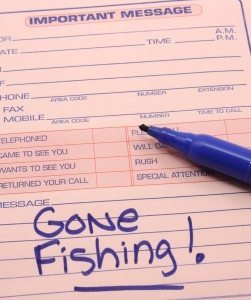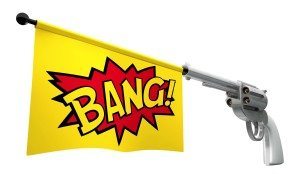 Warning to all patent and trademark practitioners—allowing a non-practitioner to “ghost sign” your name on papers filed with the USPTO can be hazardous to your law license. So learned the named partner of a large IP boutique firm who routinely allowed a non-attorney assistant to sign his name on documents filed with the Office. In re Druce, No. D2014-13 (Sept. 5, 2014).
Warning to all patent and trademark practitioners—allowing a non-practitioner to “ghost sign” your name on papers filed with the USPTO can be hazardous to your law license. So learned the named partner of a large IP boutique firm who routinely allowed a non-attorney assistant to sign his name on documents filed with the Office. In re Druce, No. D2014-13 (Sept. 5, 2014).
This matter involved Tracy Druce, an attorney who became registered to practice before the USPTO in 1992. In 2004, Mr. Druce established the IP boutique law firm of Novak Druce LLP. In 2005, the firm became known as Novak Druce + Quigg.
Between 2004 and 2006, Mr. Druce supervised an unidentified male non-lawyer assistant. Mr. Druce permitted the assistant to sign Mr. Druce’s name on patent-related filings in the USPTO. Unbeknownst to Mr. Druce, the assistant “submitted, with intent to deceive, knowingly false statements” to the USPTO “in many patent applications that [Mr. Druce] was responsible for prosecuting on behalf of clients.”
The assistant’s “false statements” included fabricating email confirmation messages; submitting fabricated confirmations to the USPTO as evidence that papers had been sent to the Office when, in fact, they were not; affixing USPTO receipt-stamped postcards and submitting the “doctored” postcards to the Office as proof of receipt when, in fact, the papers were never sent; fabricating a U.S. Postal Service Express Mail label to represent, falsely, a patent application had been mailed on a certain date when, in truth, it was never sent; and backdating certificates of mailing weeks or months earlier than the documents actually had been sent. Evidently, the assistant left the employ of Mr. Druce’s firm in 2006.
In addition to his deceit, the non-lawyer assistant—whose name was redacted from the USPTO’s Order—routinely signed Mr. Druce’s signature, or pasted digital versions of Mr. Druce’s signature—to papers filed with the Office in “many patent applications” that Druce was responsible for prosecuting. The assistant also prepared and signed Mr. Druce’s name to petitions that the assistant then filed with the Office. Mr. Druce knew his assistant had signed his name to application papers filed in many patent applications that he was responsible for prosecuting. Mr. Druce, however, denied knowledge that the assistant made any false statements to the USPTO. According to the USPTO, the non-lawyer assistant recently represented under oath that, “he acted alone and kept his conduct secret from” Mr. Druce.
While it is unclear when, exactly, the OED learned of the misconduct, it appears it commenced an investigation of Mr. Druce no later than 2013. Effective January 1, 2013, Mr. Druce’s firm merged with another law firm to become Novak Druce Connolly Bove + Quigg, LLP, the seventh largest intellectual property boutique in the United States. According to the Novak Druce law firm’s website, Mr. Druce’s practice after the merger “concentrate[d] on counseling clients regarding intellectual property matters with a focus on the prosecution and strategic planning of patent portfolios.” Mr. Druce also served as “the Chair of the firm’s Post Grant Law/Patent Reexamination practice group.”
In approximately April 2014, the OED Director filed a formal disciplinary complaint against Mr. Druce. Around this same time period, an interesting development occurred unrelated to the disciplinary proceedings. Specifically, on April 17, 2014, the USPTO announced the OED would be “conducting a survey of active registered practitioners . . . . to ascertain whether the practitioners desire to remain on the register and/or whether they need to update their contact information with OED.” The April 17 notice explained that, “A survey letter will be mailed on or about June 30, 2014, to active registered practitioners whose registration numbers are between 35,000 and 39,999” and it instructed practitioners within that numerical range to complete and return to OED a “mandatory survey form” within “forty-five (45) days of the date the survey is mailed.” The mandatory survey form asked in relevant part, “Do you wish to remain on the register?” As chance would have it, Mr. Druce’s registration number 35,493 happened to fall right in the range designated to receive the mandatory survey form.
Assuming the USPTO timely mailed the survey form, Mr. Druce would have received the form sometime in early July, 2014, and his response would have been due sometime in mid to late August, 2014. The form provided Mr. Druce an opportunity to gracefully resign his USPTO bar registration without the appearance that the resignation had anything to do with the pending disciplinary action.
In fact, that is precisely what Mr. Druce did. Although the timing is not stated, according to the USPTO’s disciplinary Order, Mr. Druce “[p]reviously . . . completed the USPTO Mandatory Survey Form” and “indicated on the survey that he did not wish to remain on the register of registered practitioners.” Accordingly, as a result of the survey response, the OED Director removed Mr. Druce from the register.
 The simple act of voluntarily dropping from the register appears to have been a turning point in the disciplinary action, since a settlement was reached with the USPTO shortly thereafter. In the settlement, Mr. Druce admitted to one count of failing to adequately supervise a non-attorney assistant in violation of former Code of Professional Responsibility 37 C.F.R. § 10.77(c), which states “a practitioner shall not . . . neglect a legal matter entrusted to the practitioner.” Mr. Druce further agreed he is “not permitted to prosecute patent applications of others before the Office or represent others in any proceedings before the Office unless and until he is reinstated to the register.” In addition, Mr. Druce agreed to contact certain patent applicants whose applications may have been affected by the assistant’s misstatements.
The simple act of voluntarily dropping from the register appears to have been a turning point in the disciplinary action, since a settlement was reached with the USPTO shortly thereafter. In the settlement, Mr. Druce admitted to one count of failing to adequately supervise a non-attorney assistant in violation of former Code of Professional Responsibility 37 C.F.R. § 10.77(c), which states “a practitioner shall not . . . neglect a legal matter entrusted to the practitioner.” Mr. Druce further agreed he is “not permitted to prosecute patent applications of others before the Office or represent others in any proceedings before the Office unless and until he is reinstated to the register.” In addition, Mr. Druce agreed to contact certain patent applicants whose applications may have been affected by the assistant’s misstatements.
If he ever applies for and is reinstated to practice before the USPTO, Mr. Druce will be subject to a two-year suspension, with the entire period of suspension stayed. Moreover, if he is reinstated, he will be placed on probation for two years commencing on the date of any such reinstatement.
According to a September 10, 2014, article published in Texas Lawyer, Mr. Druce’s disciplinary counsel stated that Mr. Druce “had removed himself from the register of practitioners prior to the disciplinary action because his practice had ‘evolved’” and thus, “It really doesn’t matter where he practices law.” Mr. Druce’s law firm also downplayed the discipline, stating it will “not affect the firm in any way.”
Maybe Mr. Druce really did not want to practice before the Office any longer, as suggested by his counsel. But it is unclear why such “evolving” required formally resigning from the patent bar. The timing of the “evolutionary” resignation also seems strange considering Mr. Druce was, at least as of December 2013, Chairman of the Reexamination and Post Grant Proceedings practice, one of the most vibrant areas in patent law.
Regardless of what he really wanted, from a disciplinary defense standpoint, the strategy Mr. Druce and his defense team implemented was quite clever. Indeed, the voluntary “drop” of Mr. Druce’s USPTO membership, coupled with the other terms of the settlement, provided Mr. Druce with a face-saving, potentially state bar license-saving, exit strategy from a situation fraught with tremendous uncertainty.
 Make no mistake – Mr. Druce faced substantial risk had he proceeded to trial. Consider, for example, a recent failure to supervise case, In re Tachner, No. D2014-22. As discussed in our August 14, 2014 post (click here), Mr. Tachner initially received a five-year suspension for failure to supervise assistants in docketing maintenance fee payments in several matters. Tachner was later disbarred for violating the terms of his suspension. Mr. Druce’s failure to supervise his assistant likewise involved multiple matters (more than the number of patents at issue in Mr. Tachner’s case leading to a five-year suspension) for multiple clients over a three-year period. If recent USPTO disciplinary precedent is any guide, a long-term suspension or exclusion from practice before the USPTO were sanctions well within the realm of possibility for Mr. Druce.
Make no mistake – Mr. Druce faced substantial risk had he proceeded to trial. Consider, for example, a recent failure to supervise case, In re Tachner, No. D2014-22. As discussed in our August 14, 2014 post (click here), Mr. Tachner initially received a five-year suspension for failure to supervise assistants in docketing maintenance fee payments in several matters. Tachner was later disbarred for violating the terms of his suspension. Mr. Druce’s failure to supervise his assistant likewise involved multiple matters (more than the number of patents at issue in Mr. Tachner’s case leading to a five-year suspension) for multiple clients over a three-year period. If recent USPTO disciplinary precedent is any guide, a long-term suspension or exclusion from practice before the USPTO were sanctions well within the realm of possibility for Mr. Druce.
Mr. Druce’s settlement also avoided the ramifications of a suspension to his USPTO registration. If he had, in fact, been suspended, then Mr. Druce would have been required to comply with 37 C.F.R. § 11.58. Section 11.58 requires, among many other things, providing notice of the suspension to every client regarding every matter before the Office in which the suspended attorney is of record. Not surprisingly, such communications are poor public relations for the suspended attorney’s firm, not to mention a humiliating experience for the suspended attorney. The USPTO’s order imposes no requirement that Mr. Druce comply with Section 11.58.
Furthermore, if he had been suspended by the USPTO, Mr. Druce would have been placing his Texas and District of Columbia law licenses in jeopardy. This is so because both Texas and the District of Columbia have special rules for reciprocal discipline of an attorney who has been ethically disciplined in another jurisdiction. A multi-year suspension or disbarment from the USPTO bar could have led to like discipline in D.C. and Texas, effectively putting Mr. Druce out of the practice of law. For a discussion of how the reciprocal discipline process works, please see our September 22, 2014 post in IP Watchdog (click here).
For now, at least, Mr. Druce, who was recently honored as a “Texas Super Lawyer,” can practice law just like any other attorney, subject of course to the geographical limits of his D.C. and Texas bar licenses. And, of course, he can not practice before the Office unless and until he is reinstated, which may or may not ever occur. Considering the alternatives, however, the end result for Mr. Druce could have been far worse.
Mr. Druce’s case serves as a cautionary reminder to all IP attorneys, whether in private practice or in-house, of their uncompromising duty to supervise lawyers and non-lawyers who work at their direction or under their supervision. Ignorance of malfeasance is not a defense for the supervisory attorney. Wrongdoing by others can lead to serious ethical consequences for the supervisor. In the document-intensive world of patent and trademark prosecution, it is particularly important for practitioners and their firms to put in place rigorous risk management procedures, which include multiple review levels, before documents are filed in the USPTO. Delegating signatory authority to secretaries, paralegals, or inexperienced practitioners, is a dangerous practice and one of many ways a patent or trademark attorney can violate the USPTO’s rules of professional conduct.
I don’t read this as a cautionary reminder. This seems more a sad statement that you can get away with anything if you are big enough.